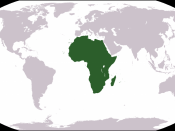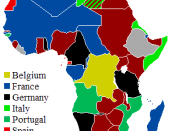Imperialism has been around for many years. Throughout history, countries have extended their rule and government to other countries. During the late nineteenth and early twentieth centuries, imperialism became an important issue in Africa. The Europeans began colonizing parts of Africa. These imperialistic movements had varying effects, some with positive repercussions, while other effects ended negatively.
By colonizing sections of Africa, the Europeans were met with many benefits. They reaped the riches of the African lands without lifting a finger. The natives were organized by the whites to do the actual labor of excavating the minerals and other resources found in the colonies. British scholar J. A. Hobson explained, "The foreigners take the wealth out of the country. All the hard work is done by the natives." This was because the whites gained a status above that of the native Africans. Putting the natives to work was a lucrative move for the Europeans.
It cost nothing for their labor and the whites made profits from the resources of the colonies. Also, the Europeans were able to gain Christian believers by converting the natives. Many natives became Christian, helping spread Christianity.
Imperialism had its good aspects for the Europeans, but it also affected them poorly in some cases. The Africans developed a hatred for the colonial powers because of the white's oppressive natures towards the natives. Sekou Toure, an African nationalist, stated, "Colonialism's greatest misdeed was to have tried to strip us of our responsibility in conducting our own affairs..." It was clear that the Africans were unhappy with the imperialists. Imperialism hit the Europeans from an economic standpoint, as well. Although they made money from African resources, colonies lost even more money. In Balance Sheets of Imperialism by Grover Clark, he writes, "Italy's trade with her colonies in 1894-1932...



Need more sources
well writen and well topic but i think it needs more souces in order to be complete.
2 out of 2 people found this comment useful.